Global Conference on Sexual Health, Reproductive Rights, and Gender Equity in Refugee and Humanitarian Crisis
Date: May 7th to 10th, 2023
Venue: Sackville Banquet Hall, 237 Sackville St, Toronto, ON M5A 3G1, Canada
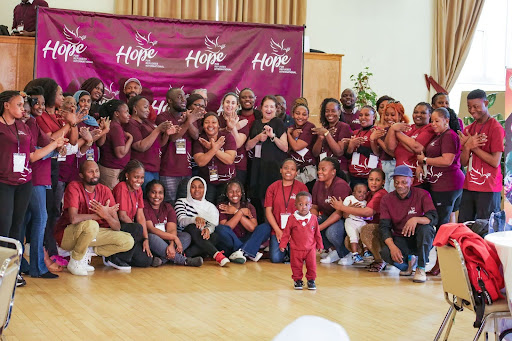
Introduction
Refugees and displaced populations, particularly women and girls, encounter significant obstacles in accessing essential Sexual and Reproductive Health (SRH) services and achieving gender equity and equality. Limited access to quality SRH services, including family planning, abortion care, maternal health, and gender-based violence support, poses serious risks to the health and well-being of displaced populations worldwide.
According to WHO estimates, approximately 4.3 million sexually active individuals globally receive inadequate access to SRH services during their lifetime. Additionally, as of June 2020, 200 million women and girls globally are still subjected to female genital cutting, with severe lifelong physical and psychological consequences. Furthermore, approximately 33,000 child marriages occur daily, 25 million unsafe abortions happen annually, and several other unresolved SRHR gaps persist.
These challenges are magnified among women and girls in refugee and humanitarian settings, where gender-based violence, unsafe abortions, and inadequate obstetric care are leading causes of female morbidity and mortality. Despite efforts, women and girls in these settings continue to be deprived of basic SRH services, resulting in devastating consequences.
Humanitarian crises exacerbate the risk of gender-based violence, disproportionately affecting displaced women and girls. Adolescents, especially girls, are at higher risk of child marriage and early pregnancy in humanitarian settings, leading to adverse health outcomes and lost opportunities. In fact, pregnancy and childbirth-related complications are a major cause of death among adolescent girls aged 15 – 19 years in humanitarian and low-income settings.
To achieve sustainable SRH, the sexual rights of all individuals must be upheld, including women, girls, and other vulnerable populations in refugee and humanitarian settings. Efforts to ensure access to quality SRH services and promote gender equity and equality are crucial to safeguarding the rights and well-being of refugee populations.
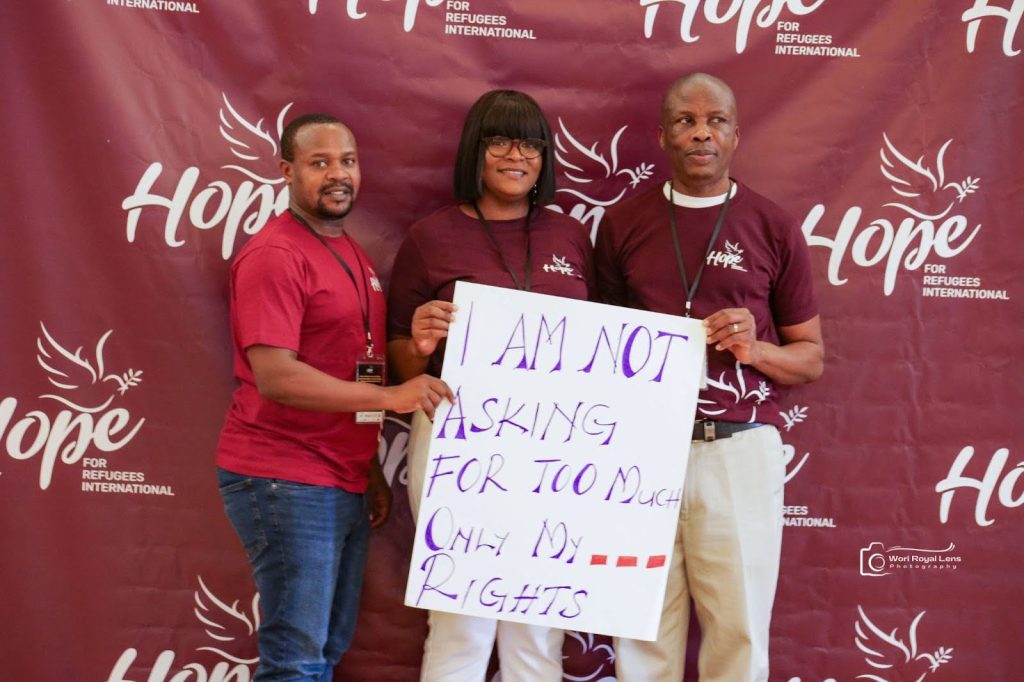
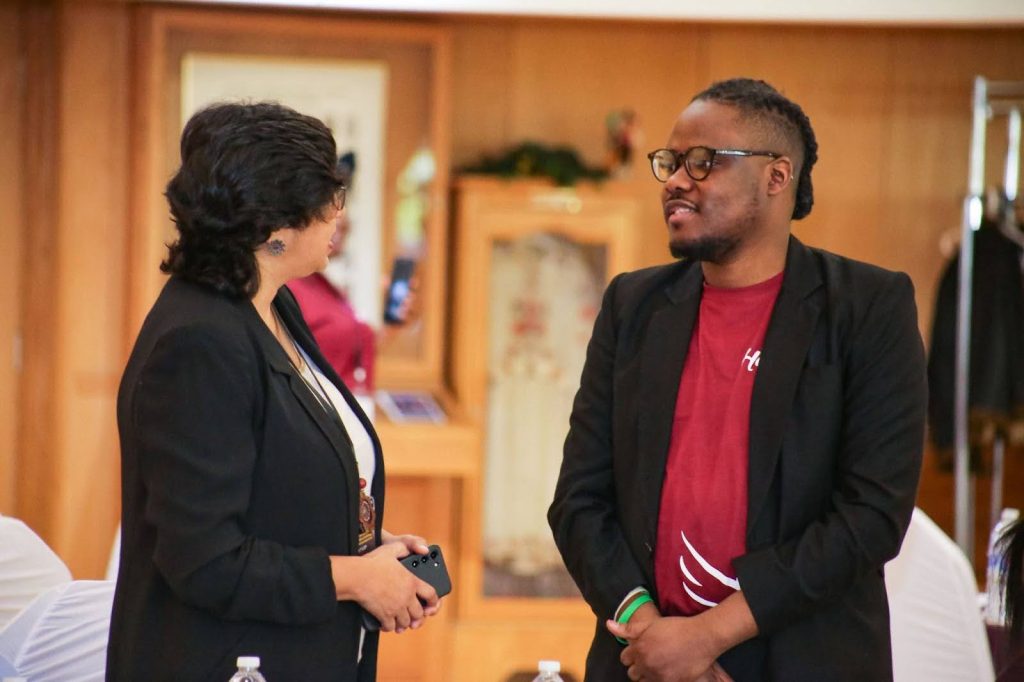
About the Conference
Hosted by Hope for Refugees International (HRI), the Global Conference on Sexual Health, Reproductive Rights, and Gender Equity in Refugee and Humanitarian Crises served as a platform to address key issues related to SRH and gender equity in refugee and humanitarian crises. The conference was held from May 7th to 10th, 2023 in Toronto, Canada.
Convened under the theme: “Rights, Dignity, and Access: Advancing Sexual Health and Reproductive Rights Amidst Refugee and Humanitarian Crisis,” the conference aimed to assemble stakeholders from various sectors to engage in dialogue, share knowledge, and propose actionable solutions to tackle challenges related to Sexual Reproductive Health and Rights and gender equity issues. Leveraging collaborative efforts, the conference strived to restore dignity, rights, and access to sexual and reproductive health services.
Conference Objectives
The Global Conference on Sexual Health, Reproductive Rights, and Gender Equity in Refugee and Humanitarian Crises was organized under the following objectives.
1. Enhance Knowledge Exchange
Expected Outcome: Facilitate cross-sectoral dialogue leading to the sharing of innovative strategies, research findings, and best practices related to sexual health, reproductive rights, and gender equity in humanitarian crises.
2. Strengthen Policy Advocacy
Expected Outcome: Foster a collaborative environment where policymakers, NGOs, and advocates can develop actionable policy recommendations to improve sexual and reproductive health services for refugees and those affected by crises.
3. Empower Local Communities
Expected Outcome: Empower local communities through capacity-building workshops and initiatives that equip them with the skills and resources to take an active role in promoting sexual health, reproductive rights, and gender equity in their own contexts.
4. Forge Strategic Partnerships
Expected Outcome: Facilitate the establishment of partnerships between governments, humanitarian organizations, and private sector entities to enhance funding and support for initiatives addressing sexual and reproductive health in crisis settings.
5. Publish Comprehensive Recommendations
Expected Outcome: Compile and publish a comprehensive set of recommendations and action plans based on conference discussions, ensuring that tangible steps are taken to improve sexual health, reproductive rights, and gender equity in humanitarian crises on a global scale.
6. Foster Inclusive Dialogue and Learning
Expected Outcome: Create a safe and inclusive platform for refugees, humanitarian workers, and social workers to share their lived experiences, challenges, and successes, thereby promoting mutual learning, empathy, and amplification of voices within the summit’s discussions and beyond.
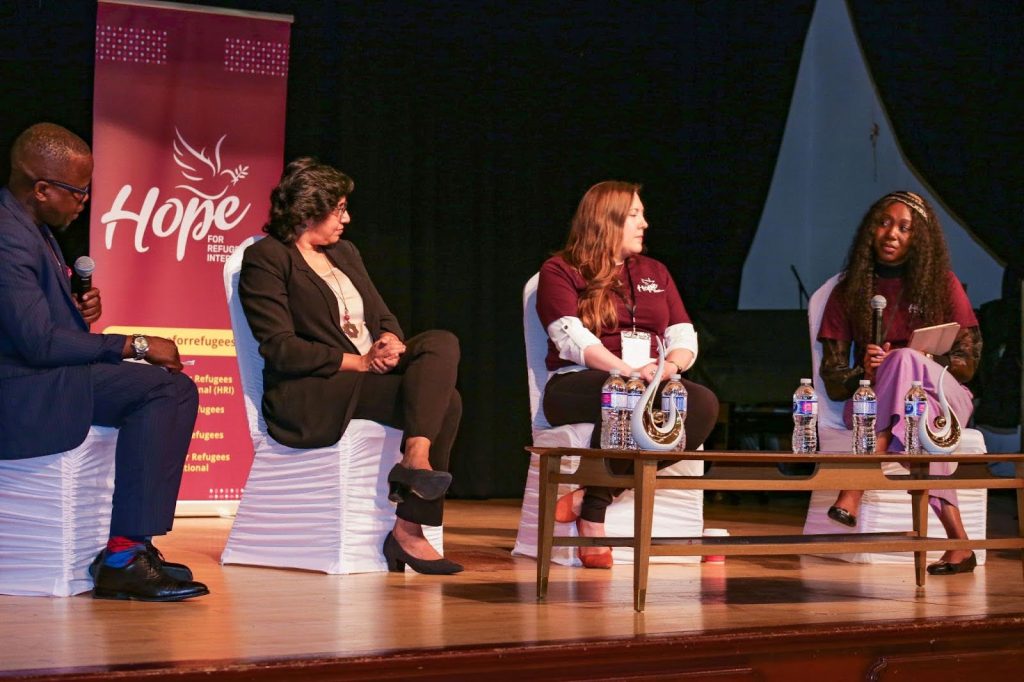
Key of the Highlights Conference
Day 1:
The conference commenced with a powerful keynote address from Bansal Nidhi, the Director of Program, Quality, and Impact at Care Canada. Nidhi emphasized the urgency of addressing SRHR and gender equity in refugee and humanitarian responses, highlighting the fundamental issues of dignity and protection.
Following the keynote, Lisa Duplessis, the Director of Program and Community Service at the 519 advocated for the rights and dignity of refugees. A panel discussion ensued, focusing on the challenges and solutions regarding SRHR in refugee and humanitarian crises, featuring experts such as Sarah Flanagan, Jonta Kamara, Bansal Nidhi, and Lisa Duplessis.
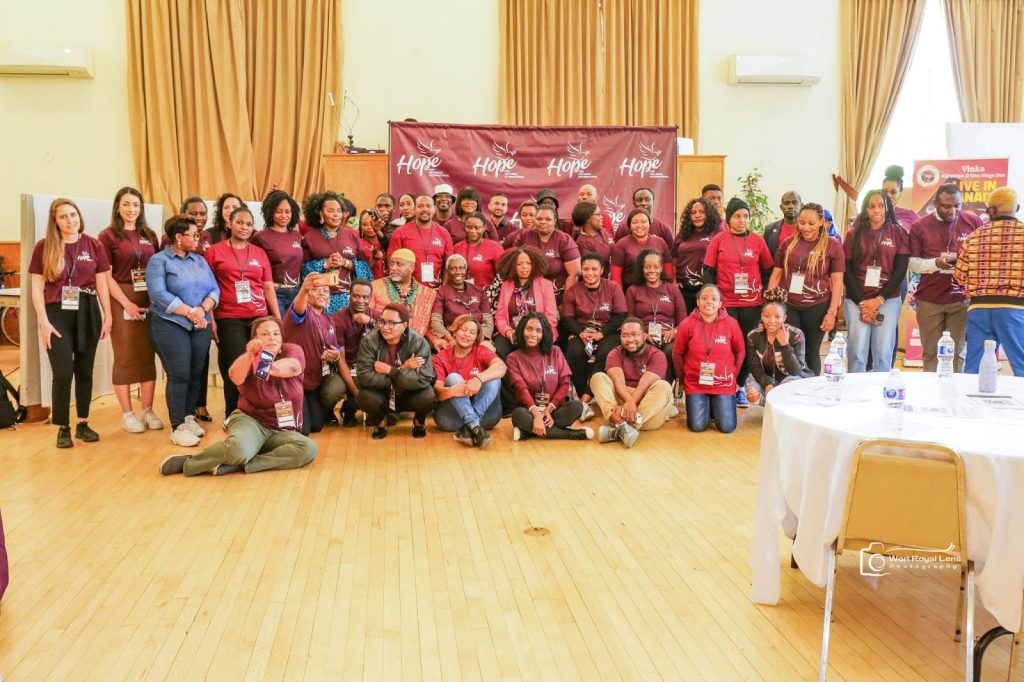

The panel discussions delved into a comprehensive examination of the state of Sexual Reproductive Health and Rights (SRHR) in refugee and humanitarian settings, both in Canada and globally. The discussions encompassed a wide range of topics, including sexual health, reproductive rights, maternal and child health, and gender equity.
Experts participating in the panel discussed the specific challenges that refugees and newcomers, particularly women, girls, young people, and LGBTQ+ individuals, face in accessing essential SRHR services ranging from contraceptive services, abortion care, HIV/STI services, and maternal and child health services, highlighting that such challenges include systemic barriers, language barriers, cultural differences and limitations, limited access to healthcare
The session also sheded light on the importance of upholding the rights and dignity of refugees in accessing sexual reproductive health information resources and services. Participants emphasized the need for respectful, culturally appropriate, and non-discriminatory care that considers the unique needs and backgrounds of refugees and other vulnerable populations.
In addition to discussing the challenges, the session also explored innovative solutions and strategies aimed at improving access to SRHR services for refugees, noting that this would involve initiatives such as community-based healthcare programs, mobile clinics, and the integration of SRHR education into existing support systems.
The next session after an exciting and interactive lunch break where we enjoyed a lot of African cousins was on “Empowering Local Communities:” Enhancing Access to Sexual Reproductive Health Services for Refugees and Vulnerable Populations”.
This session facilitated by Maryam Pandi and Kendra Weerheim explored capacity-building initiatives, raised awareness, and facilitated discussions on best practices to empower local communities in delivering and improving access to essential Sexual Reproductive Health and Rights (SRHR) Services for refugees and vulnerable populations. With a focus on increasing access and quality of care, the session highlighted the importance of community involvement, the role of community health workers, and collaboration in addressing the SRHR needs of marginalized groups.
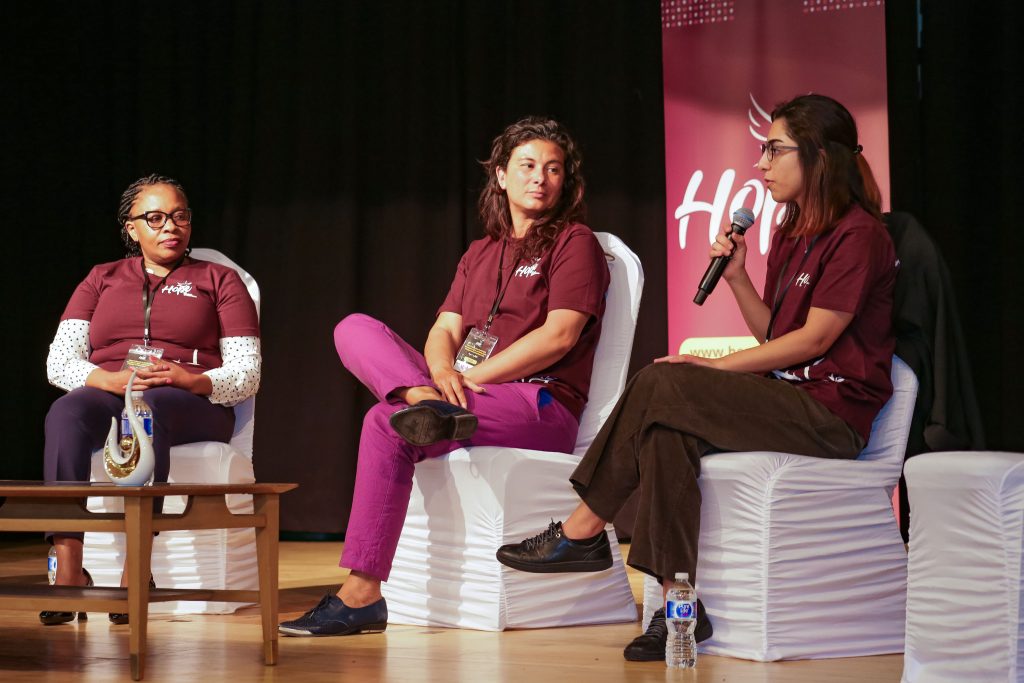
The session further explored strategies to overcome barriers to accessing SRHR services among refugee communities. Maryam Pandi the Executive Director of Choice in Health Clinic shared an overview of abortion access and barriers to care in Canada sharing examples of Choice in Health Clinic’s approaches and strategies for addressing these barriers to ensure access to abortion services for marginalized populations. She highlighted the state of reproductive health access in Canada noting that abortion is legal in Canada and there have been major gains in recent years with British Colombia becoming the first province to offer universal contraception and more recently with the federal program for pharmacare.
Maryam also informed participants that Choice in Health Clinic offers trauma-informed, gender I inclusive, culturally sensitive, non-judgmental reproductive health services that focus on indigenous and cultural safety.
In her presentation, Kendra Weerheim passionately shared her work, empowered and raised awareness of participants on a range of sexual reproductive health issues ranging from cancer screening (breast cancer, colorectal and cervical cancer), sexually transmitted infections, virginity testing, contraception, culturally safe practices, and confidentiality.
In her presentation, Kendra also highlighted some assumptions about sexual and reproductive health for both providers and clients assumptions.
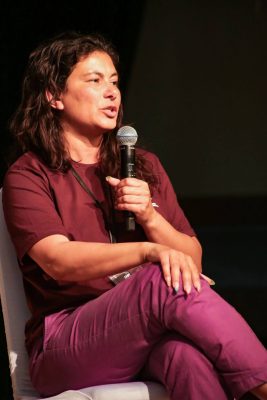
Provider Assumptions
- Hijabi women don’t want contraception.
- People have sex before and outside of marriage.
- Client literacy/health literacy meets a certain standard.
- If you can’t understand me, I will just speak louder.
- Newcomers don’t want to prevent pregnancy.
- In “their” culture, contraception/birth spacing is forbidden.
- Client Assumptions.
- My provider will think poorly of me if I ask.
- My provider knows what’s best for me.
- I can’t ask for help.
- My provider won’t understand.
- I have to take this medication until I finish it
- If I don’t understand, I will just say yes
Day 2:
Session 1: Breaking Barriers: Tackling HIV/AIDS Stigma and Improving Access for Black and LGBTQ+ Refugees.
The day began with a thought-provoking session on tackling HIV/AIDS stigma, emphasizing the unique challenges faced by Black and LGBTQ+ refugees in accessing care and support. Panelists, including healthcare professionals, activists, and community leaders, shared insights into the pervasive stigma surrounding HIV/AIDS and its detrimental effects on refugee communities.
Ian McKnight, a leading HIV/AIDS advocate, highlighted the intersectionality of stigma, discrimination, and access to care, particularly for marginalized groups. He emphasized the need for culturally competent healthcare services and community-driven initiatives to combat stigma and promote HIV/AIDS awareness and testing.
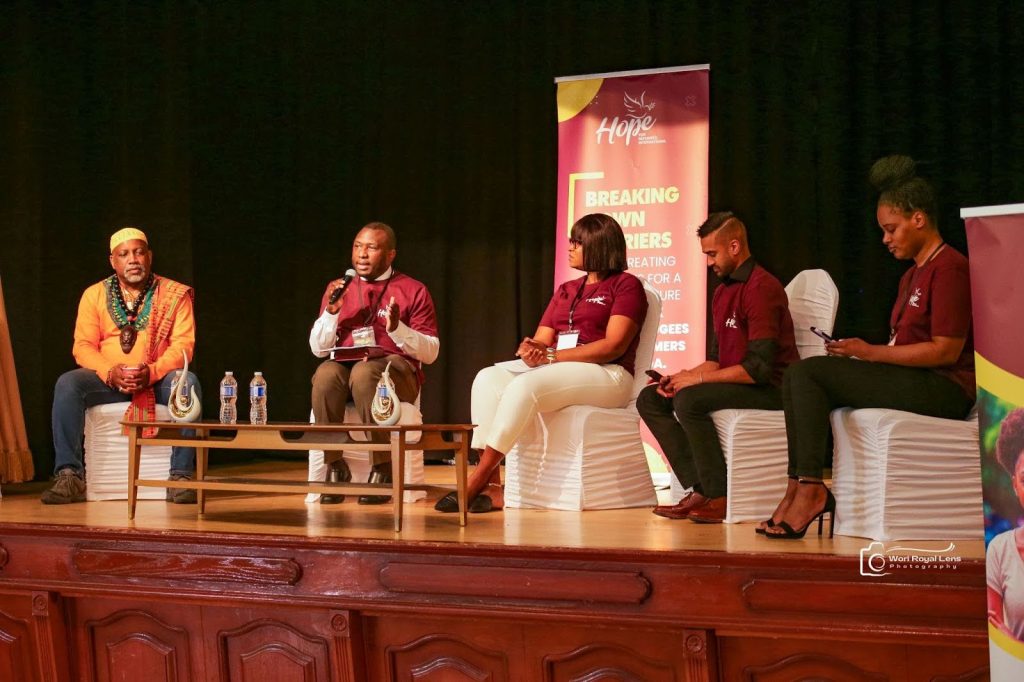
Emmanuel Ndyanabo Lambert, a refugee advocate, shared his personal experiences navigating HIV/AIDS stigma within refugee communities. Lambert underscored the importance of peer support networks and grassroots initiatives in challenging stigma and fostering acceptance and inclusion.
Shamin Mohamed Jr., from LetsStope AIDs, highlighted the additional layers of stigma and discrimination faced by young people and LGBTQ+ refugees living with HIV/AIDS. Mohamed emphasized the need for intersectional approaches that address the unique needs and vulnerabilities of young people in accessing healthcare and support services.
Ssimba Aloysius Anna, a healthcare provider specializing in refugee health, discussed best practices for delivering culturally sensitive HIV/AIDS care in refugee settings. Anna stressed the importance of holistic care approaches that prioritize dignity, respect, and confidentiality while addressing the complex social determinants of health.
The session concluded with a call to action for governments, NGOs, and civil society organizations to prioritize HIV/AIDS awareness, prevention, and care for refugees and displaced persons, with a focus on addressing stigma and discrimination.
Session 2: Towards Holistic Approaches: Integrating SGBV Prevention with SRH Services
The second session of the day focused on the integration of Sexual and Gender-Based Violence (SGBV) prevention with SRH services in refugee and humanitarian contexts. Panelists, including SGBV experts, healthcare providers, and policy advocates, explored innovative strategies to address the intersecting challenges of SGBV and SRH in crisis settings.
Blessing Digha, a leading SGBV advocate, provided an overview of the prevalence and impact of SGBV on refugee communities, emphasizing the urgent need for comprehensive prevention and response efforts. Digha highlighted the importance of survivor-centered approaches that prioritize safety, autonomy, and empowerment.
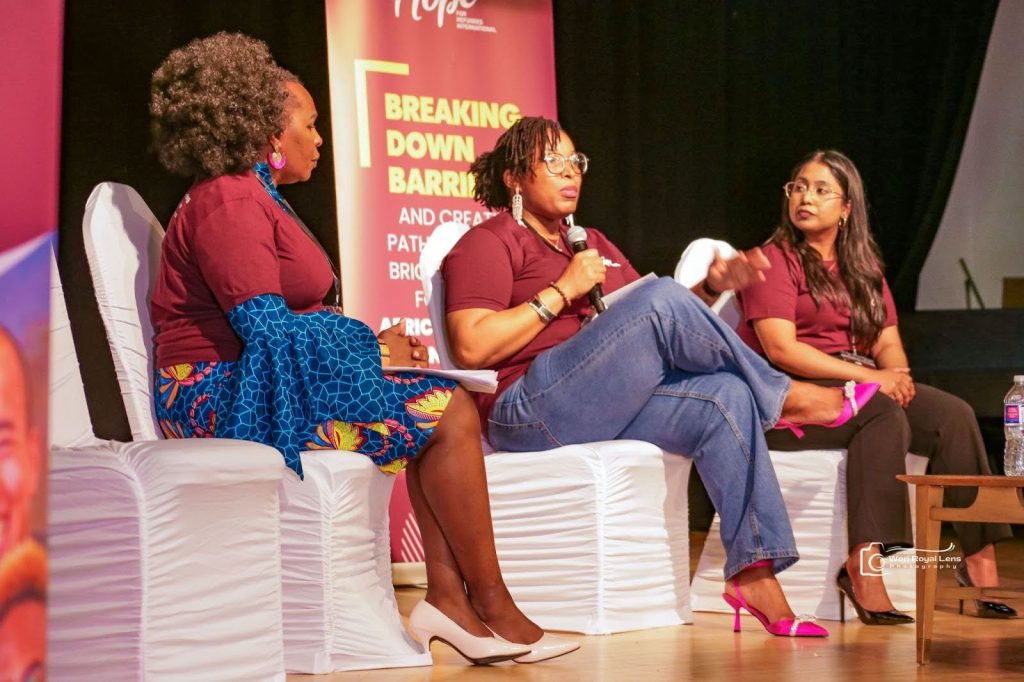
Pauline Wangari, a healthcare professional specializing in SGBV care, shared practical insights into integrating SGBV prevention and response services within SRH programs. Wangari underscored the importance of multidisciplinary collaboration, survivor support networks, and community engagement in addressing SGBV within humanitarian settings.
Tashin Rodoshi, a policy analyst focusing on gender equity and human rights, discussed policy frameworks and advocacy strategies to promote the integration of SGBV prevention with SRH services. Rodoshi emphasized the need for gender-responsive policies that address the root causes of SGBV, including gender inequality, social norms, and power dynamics.
The session concluded with a call for greater investment in survivor-centered SGBV prevention and response programs, along with sustained efforts to address the structural drivers of violence and discrimination in refugee and humanitarian settings.
Session 3: Amplifying Youth Voices: Advocating for SRHR and SGBV Response
The final session of the day centered on amplifying youth voices in advocating for Sexual and Reproductive Health and Rights (SRHR) and SGBV response in refugee settings. Youth activists, advocates, and representatives from youth-led organizations shared their experiences, challenges, and aspirations for promoting SRHR and gender equity among refugee youth.
Simona William, a youth advocate and SRHR educator, highlighted the importance of meaningful youth participation in decision-making processes and program development. William emphasized the need for age-appropriate, inclusive, and culturally sensitive SRHR education and services that empower young refugees to make informed choices about their health and well-being.
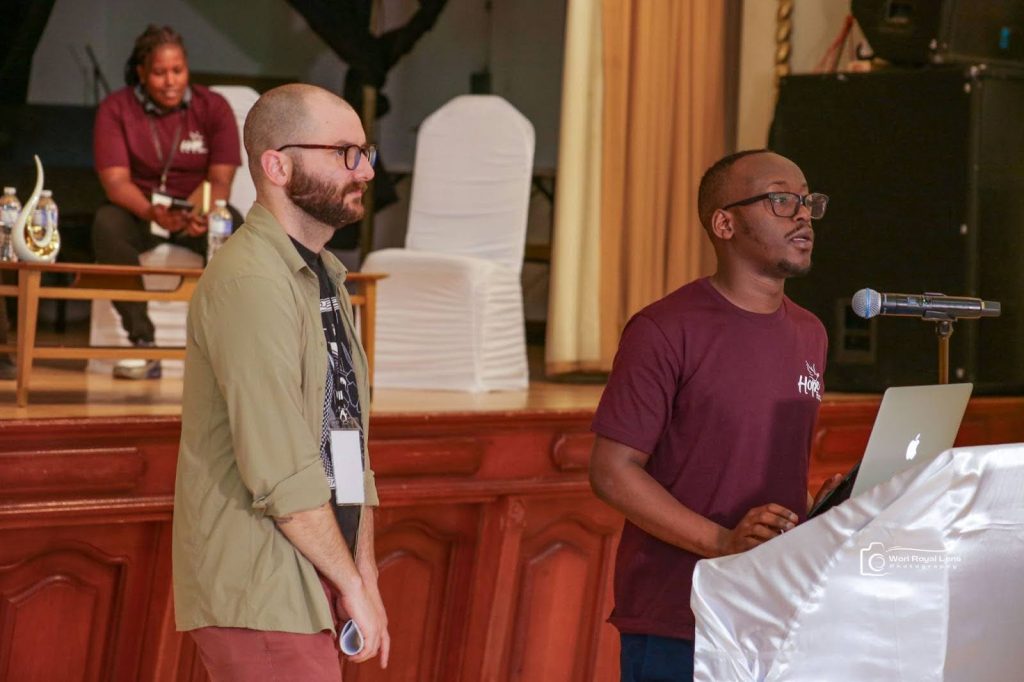
Andrew Townsend, a LGBTQ+ youth activist, discussed the unique vulnerabilities and barriers faced by LGBTQ+ refugee youth in accessing SRHR services and support. Townsend underscored the need for LGBTQ+-inclusive policies, programs, and healthcare providers that affirm the identities and experiences of LGBTQ+ youth and address their specific health needs.
Representatives from youth-led organizations shared their innovative approaches to addressing SRHR and SGBV among refugee youth, including peer education, digital outreach, and arts-based activism. They emphasized the importance of collaboration, mentorship, and solidarity in amplifying youth voices and driving positive change within refugee communities.
The session concluded with a collective commitment to supporting and empowering refugee youth as agents of change in promoting SRHR, gender equity, and social justice. Participants pledged to prioritize youth-led initiatives, create safe and inclusive spaces for dialogue and advocacy, and advocate for policies and programs that meet the diverse needs of refugee youth.
The second day of the conference provided a platform for in-depth discussions, insights, and collaborations aimed at addressing the complex challenges of HIV/AIDS stigma, SGBV prevention, and youth empowerment in refugee and humanitarian settings. By centering the voices and experiences of marginalized communities, participants reaffirmed their commitment to advancing SRHR, gender equity, and human rights for all displaced persons worldwide.
Recommendations
Service Providers
- Implement culturally sensitive training programs for healthcare providers to ensure respectful, non-discriminatory care for refugees.
- Establish mobile clinics and community-based healthcare programs to enhance access to SRHR services in refugee communities.
- Integrate SRHR education into existing support systems, with a focus on addressing cultural norms and language barriers.
- Foster partnerships with community organizations to expand outreach and service delivery to vulnerable refugee populations.
- Prioritize trauma-informed and gender-inclusive approaches in SRHR service provision to promote dignity and respect for refugees.
- Develop targeted interventions to address HIV/AIDS stigma and discrimination within refugee communities, including culturally sensitive education and outreach programs.
- Implement comprehensive SGBV prevention strategies within SRHR service delivery, including trauma-informed care and survivor-centered approaches.
- Expand access to youth-friendly SRHR services through community-based initiatives and peer support networks.
- Strengthen partnerships with refugee-led and youth-led organizations to enhance the engagement and participation of refugee youth in SRHR programming.
- Provide training for healthcare providers on the intersectionality of SGBV and SRHR to improve service delivery for vulnerable populations.
Policy Makers
- Allocate funding and resources to support community-based initiatives aimed at improving access to SRHR services for refugees.
- Develop and implement policy frameworks that address systemic barriers, including legal status and discrimination, hindering refugees’ access to SRHR services.
- Establish guidelines for culturally appropriate SRHR education and service provision within refugee and humanitarian settings.
- Strengthen collaboration between government, refugee serving organizations, and stakeholders to ensure coordinated efforts in addressing SRHR needs.
- Advocate for inclusive policies that protect and promote the sexual reproductive rights of refugees, particularly women, girls, and LGBTQ+ individuals.
- Advocate for policies that prioritize equity in healthcare delivery for black and LGBTQ+ refugees living with HIV/AIDS, including increased funding for community-based HIV programming.
- Support initiatives that address systemic barriers to accessing SRHR services for refugee women, girls, and LGBTQ+ individuals, including legal reforms and anti-discrimination measures.
- Incorporate SGBV prevention efforts into refugee health policies and guidelines, with a focus on survivor support and community engagement.
- Promote youth-friendly policies and programs that empower refugee youth to access SRHR services and participate in decision-making processes.
- Invest in research and data collection to inform evidence-based policies and interventions aimed at improving SRHR outcomes for refugee populations.
Conclusion
The Global Conference on Sexual Health, Reproductive Rights, and Gender Equity in Refugee and Humanitarian Crisis provided a platform for dialogue, collaboration, and advocacy to address the complex challenges faced by refugees in accessing essential SRHR services and achieving gender equity and equality. Moving forward, concerted efforts from service providers, policymakers, and community stakeholders are essential to advance the rights, dignity, and access to SRHR services for refugees, ultimately contributing to improved health outcomes and gender equity in refugee and humanitarian settings.
Through engaging discussions, innovative solutions, and collaborative efforts, participants reaffirmed their commitment to upholding the sexual rights and dignity of all individuals, particularly women, girls, and vulnerable populations in refugee settings. As we move forward, it is imperative to translate the insights and commitments from the conference into tangible actions and policies that prioritize SRH and gender equity in humanitarian responses and support the well-being of displaced populations worldwide.